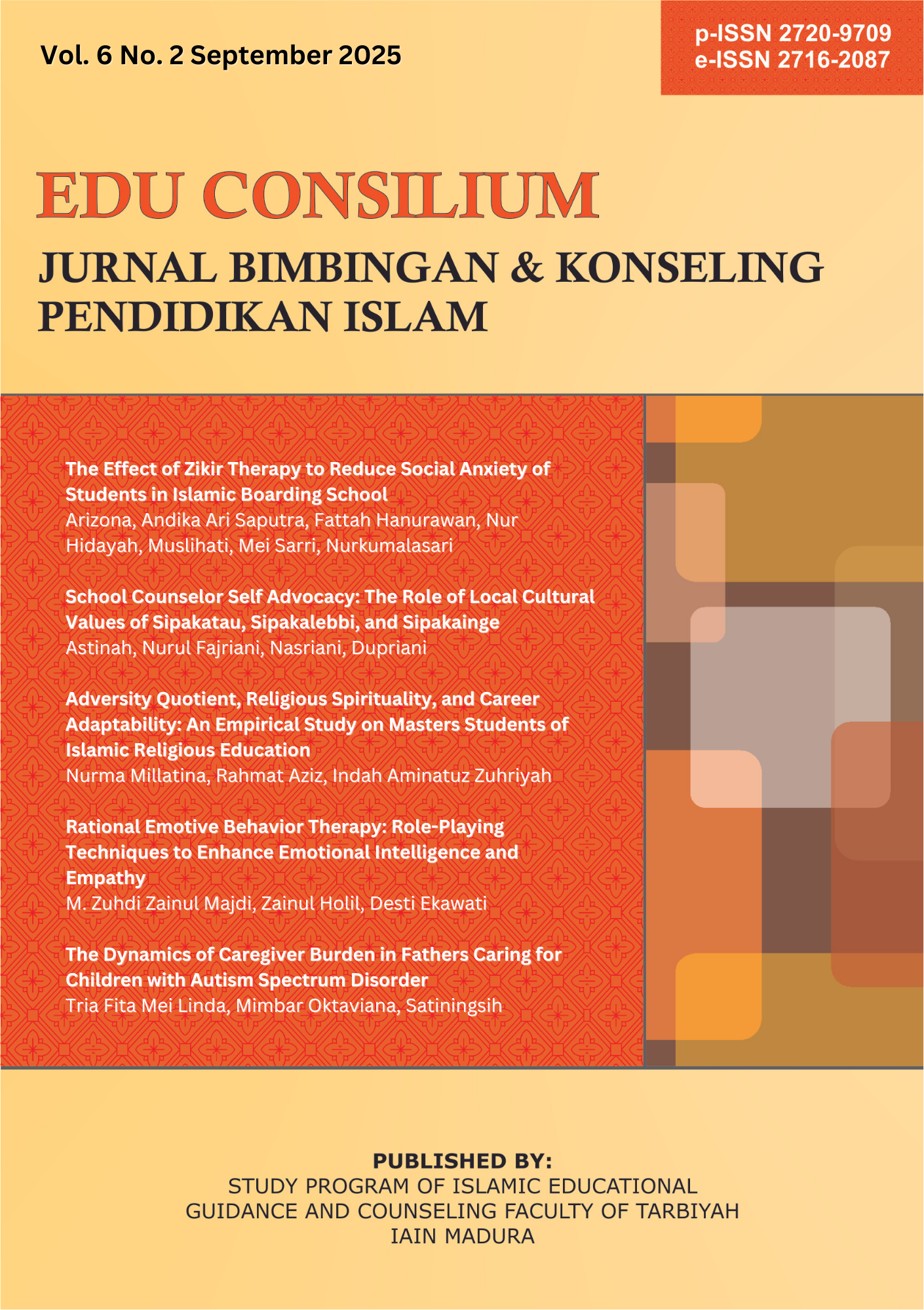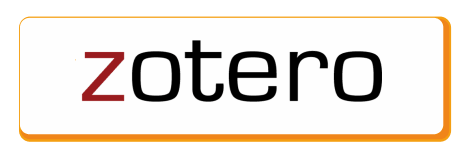School Counselor Self-Advocacy: The Role of Local Cultural Values of Sipakatau, Sipakalebbi, and Sipakainge
 Abstract views: 330
,
Abstract views: 330
,
 PDF downloads: 287
PDF downloads: 287
Abstract
The role of guidance and counseling teachers is often marginalized within the institutional structure of schools. Therefore, developing self-advocacy grounded in local cultural values becomes a strategic means of enhancing the legitimacy and effectiveness of counseling services. This research aims to explore the self-advocacy practices of school counselors at SMPN X in Parepare City and to analyze the application of local cultural values—sipakatau, sipakalebbi, and sipakainge—in strengthening guidance and counseling services. The data collected using a qualitative approach with a case study method through in-depth interviews, participant observation, and document analysis. The research involved three guidance counselors with more than five years of experience, supported by principals, teachers, students, and parents. Data analysis was conducted through the processes of transcription and coding of interview and observation data. The data were then analyzed thematically to identify meaningful patterns and relationships. The validity of the research findings was ensured through data triangulation, as well as the implementation of member checking and peer debriefing procedures. The findings show that self-advocacy enables BK teachers to expand their roles through communication and active collaboration with school stakeholders, which impacts the strengthening of counseling services. Self-advocacy grounded in sipakatau helps foster respectful interactions among students, teachers, principals, and parents; sipakalebbi enhances social relationships through appreciation and respect; and sipakainge ensures the effectiveness of preventive guidance through mutual reminders. These findings affirm the importance of integrating self-advocacy and local cultural values in creating inclusive and socially relevant counseling services. This study is expected to contribute to the development of culturally grounded counseling theory and practice adaptable across various school contexts.
Downloads
References
Adiputra, S., & Mujiyati, M. (2018). Multicultural Counseling in Cultural Perspective Indonesia. Proceedings of the 1st International Conference on Education Science. Vol 1. Pp 544-549.
Anggraeni, R., Zahro, V., & Taniady, V. (2020). Internalisasi Nilai Kebudayaan Lokal Bugis (Sipakatau, Sipakalebbi, dan Sipakainge): Upaya meningkatkan Pendidikan Karakter Ideal di Era Digital. Jurnal PAKAR Pendidikan, 18(1), 35–45. https://doi.org/10.24036/PAKAR.V18I1.217
Arrieta, G. S., Valeria, J. R. B., & Belen, V. R. U. (2021). Counseling Challenges in the New Normal : Inputs for Quality Guidance and Counseling Program. Counsellia: Jurnal Bimbingan Dan Konseling, 11(1), 71–85. https://doi.org/10.25273/COUNSELLIA.V11I1.8802
Cervoni, A., & Delucia-Waack, J. (2015). Role Conflict and Ambiguity as Predictors of Job Satisfaction in High School Counselors.
Cigrand, D. L., Havlik, S. G., Malott, K. M., & Jones, S. G. (2015). School Counselors United in Professional Advocacy: A Systems Model. Journal of School Counseling, 13(8).
Creswell, J. W., & Poth, C. N. (2017). Qualitative Inquiry and Research Design: Choosing Among Five Approaches. SAGE Publications. https://books.google.co.id/books?id=Pz5RvgAACAAJ
Dimmitt, C. (2003). Transforming School Counseling Practice through Collaboration and the Use of Data: A Study of Academic Failure in High School. Professional School Counseling, 6(5), 340–349.
Pambudi, E, Y., & Amini, N, K, S. (2021). Peran Kepala Sekolah terhadap Manajemen Guru Bimbingan dan Konseling di Masa Pandemi. Edu Consilium : Jurnal Bimbingan Dan Konseling Pendidikan Islam, 2(2), 21–34. https://doi.org/10.19105/EC.V2I2.4983
Fava, D. C., Andretta, I., & Marin, A. H. (2023). Assessment of the intervention process with teacher to prevent children behavior problems. Estudos de Psicologia, 40. https://doi.org/10.1590/1982-0275202340e210002
Field, J. E., & Baker, S. (2015). Defining and Examining School Counselor Advocacy. Professional School Counseling, 8(1), 56–63. https://doi.org/https://doi.org/10.5330/1096-2409-8.1.56
Halima, A., Khumas, A., & Zainuddin, K. (2021). Sipakatau, Sipakainge, Sipakalebbi: Sebuah Nilai Budaya untuk Upaya Pencegahan Bullying dengan Memaksimalkan Peran Bystander. Indonesian Psychological Research, 3(2), 82–90. https://doi.org/10.29080/IPR.V3I2.549
Hanifah, N., & Fahyuni, E. (2021). Eksistensi Layanan Bimbingan Konseling di Masa Pandemi COVID-19. Counsellia: Jurnal Bimbingan Dan Konseling, 11(2), 180–192. https://doi.org/10.25273/COUNSELLIA.V11I2.9430
Hartono. (2009). Penajaman Pelayanan Bimbingan dan Konseling. Jurnal Psikologi Pendidikan dan Bimbingan. 10(2), 88–94. https://karyailmiah.unipasby.ac.id/2010/01/11/penajaman-pelayanan-bimbingan-dan-konseling-pada-jalur-pendidikan-formal/
Havlik, S., Ciarletta, M., & Crawford, E. (2019). “If We Don’t Define Our Roles, Someone Else Will”: Professional Advocacy in School Counseling. Professional School Counseling, 22(1), 2156759X1984833. https://doi.org/10.1177/2156759X19848331
Havlik, S., Malott, K., Yee, T., DeRosato, M., & Crawford, E. (2019). School Counselor Training in Professional Advocacy: The Role of the Counselor Educator. Journal of Counselor Leadership and Advocacy, 6(1), 71–85. https://doi.org/10.1080/2326716X.2018.1564710
Hermawan, R., & Pransiska, R. (2020). The Role Of School Conselors In Advocacy Services. International Journal of Applied Guidance and Counseling, 1(1), 20–27. https://doi.org/10.26486/IJAGC.V1I1.1046
Kay, J., Muola, J., & Ondima, P. C. (2019). Influence of Guidance and Counselling Programmes on Secondary Students School Connectedness. A Case Study of Nyamira County, Kenya. Journal of Education and Practice, 10(22). https://doi.org/10.7176/JEP
Nur, R. J., Wildan, D., & Komariah, S. (2023). Kekuatan Budaya Lokal: Menjelajahi 3S (Sipakatau, Sipakalebbi, dan Sipakainge’) sebagai Simbol Kearifan Lokal. MIMESIS, 4(2), 166–179. https://doi.org/10.12928/MMS.V4I2.8105
Peed, T. A., Stevens, H., Peed, T. A., & Stevens, H. (2021). The Culturally Connected School Counselor: Best Practices and Considerations. In Research Anthology on Navigating School Counseling in the 21st Century (pp. 417–437). IGI Global Scientific Publishing. https://doi.org/10.4018/978-1-7998-8963-2.CH023
Pertama, M. S., & Rahmi, A. (2023). Kerjasama Guru BK dan Guru Mata Pelajaran dalam Mengatasi Kesulitan Belajar Siswa di SMP Negeri 02 Mungka. ALSYS, 3(4), 326–338. https://doi.org/10.58578/alsys.v3i4.1298
Riggs, C. (2020). The relationship between school counselors’ self-advocacy skills and the implementation level of comprehensive school counseling programs. https://doi.org/10.17760/D20350255
Sibandze, B. D., & Mafumbate, R. (2019). Challenges Faced by Teachers in the Implementation of Guidance and Counselling in Eswatini Primary Schools. 10(12). https://doi.org/10.7176/JEP
Subhan, N. I., Basuki, A., Sabila, N. S., & Wulandari, A. S. (2023). Nilai Budaya Sipakatau Masyarakat Bugis Dalam Konseling Analisis Transaksional: Literature Review. JBKI (Jurnal Bimbingan Konseling Indonesia), 8(3), 136–145. https://journal.stkipsingkawang.ac.id/index.php/JBKI/article/view/4922
Trusty, J., & Brown, D. (2005). Advocacy Competencies for School Counselors. Professional School Counseling, 8(1), 56–63. https://doi.org/10.5330/1096-2409-8.1.56
Wilder, C. (2018). Promoting the Role of the School Counselor. Journal of Professional Counseling: Practice, Theory & Research, 45(2), 60–68. https://doi.org/10.1080/15566382.2019.1646085
The journal operates an Open Access policy under a Creative Commons Non-Commercial 4.0 International license. Authors who publish with this journal agree to the following terms:
- Authors retain copyright and grant the journal right of first publication with the work simultaneously licensed under a
 Commons Attribution-NonCommercial 4.0 International License
Commons Attribution-NonCommercial 4.0 International Licensethat allows others to share — copy and redistribute the material in any medium or format, and adapt — remix, transform, and build upon the material.
- Authors are able to enter into separate, additional contractual arrangements for the non-exclusive distribution of the journal's published version of the work (e.g., post it to an institutional repository or publish it in a book), with an acknowledgement of its initial publication in this journal.
- Authors are permitted and encouraged to post their work online (e.g., in institutional repositories or on their website) prior to and during the submission process, as it can lead to productive exchanges, as well as earlier and greater citation of published work (see The Effect of Open Access).




















